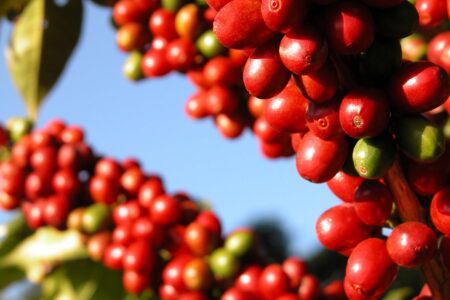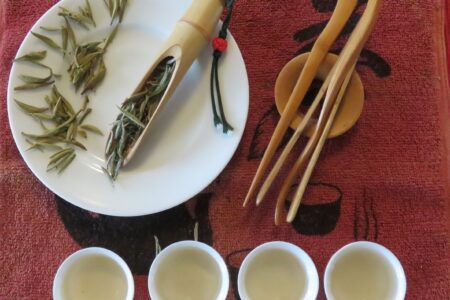The pandemic spurs an ever-increasing demand for wellness teas
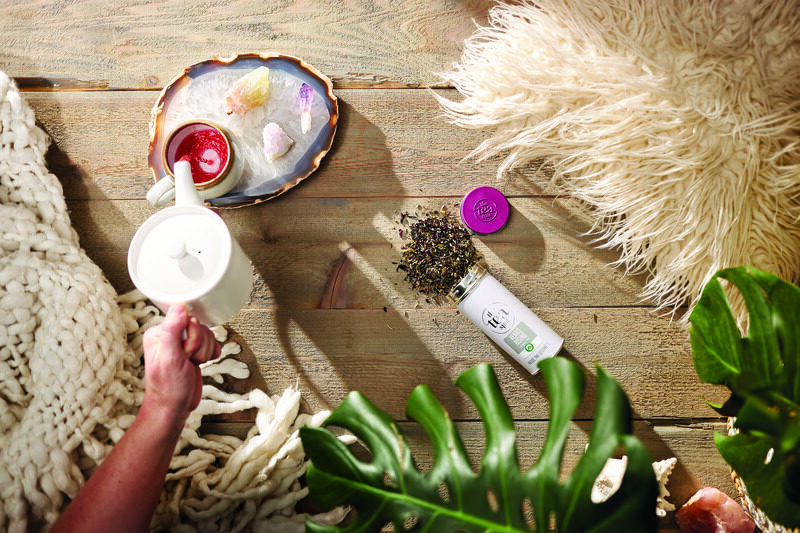
Herbal teas such as The Tea Spot’s Tea Beauty line, is designed to ’enhance skin from within.’ Image: The Tea Spot
As consumers actively seek food and beverages that support their physical and mental wellbeing, from boosting immune systems, enhancing moods, sustaining energy, and reducing stress, the functional/wellness category will continue to experience strong growth. For the tea industry, this is an opportune moment on which to capitalise. By Aaron Kiel
Wellness teas have experienced an ongoing rise since the global Covid-19 pandemic began, and there’s no sign that the trend is ending anytime soon. Thus, it’s a clear opportunity for the tea industry and beverage developers alike, to capitalise on the growth.
In November 2020–amidst the early phase of tea’s newfound popularity during the Covid-19 pandemic–writer/reporter Rebecca Deczynski summed it up at Refinery 29: “Right now, tea culture is at its peak. You’ve likely found yourself scrolling past targeted ads for herbal elixirs or swiping through endless Instagram stories depicting still-steaming mugs. You’ve heard celebrity endorsements for choice brews, and you’ve read about ‘wellness tea’ in magazine roundups devoted to self-care. The stuff is more popular than ever…”
John Lenz, the vice president of sales and president of hospitality at Intelligent Blends in San Diego, California, reported that while coffee is still considered a relatively healthy beverage, tea boasts the most benefits over any other type of beverage. “Wellness teas were already on the rise before the pandemic, but as more people looked for solutions to boost immunity, they found tea,” said Lenz. “Living through a pandemic has made many people realise the importance of immunity-boosting food and beverages.”
High demand for functional beverages
Chicago-based ADM, a leader in nutrition and a partner to the world’s leading consumer brands, regularly looks at consumer trends through its proprietary “Outside Voice” consumer insights platform. The organisation’s recent 2021 research found that 31 per cent of consumers are purchasing more items tailored for their health, and 50 per cent report a preference for foods and beverages that naturally contain beneficial ingredients. ADM also noted that the desire to influence health and wellness through foods and beverages is creating new opportunities for nutrient-dense products with functional health benefits aimed at supporting immune systems, enhancing mood and sustaining energy.
Vince Macciocchi, senior vice president and president of ADM’s Nutrition business unit, and the company’s chief sales and marketing officer, explained, “The global health crisis has changed consumer preferences in new and unexpected ways. We are seeing a heightened demand for foods and beverages that support immune systems, enhance our mood and reduce our environmental impact, driven in part by emerging human tensions. This has provided a unique opportunity for brands to develop disruptive new products that will forever change the way we eat and drink.”
Maria Uspenski, founder and CEO of The Tea Spot – which offers numerous premium teas focused on wellness and functional benefits, shared, “Consumers are seeking natural ways to support wellness, whether it’s strengthening immunity, helping reduce stress, or bringing oneself ‘back into balance’ with a cup of tea. In fact, consumers are seeking all varieties of tea–including traditional teas, functional teas, botanicals, and herbal blends. We expect that premium tea and specialty wellness teas will continue to stay in the forefront of consumers’ minds.”
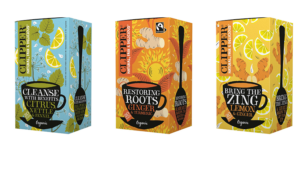
Clipper Teas launched a functional teas line in 2021 designed to improve moods. Image: Clipper Teas
Shabnam Weber, the president of The Tea and Herbal Association of Canada, a leading authority on all things tea in Canada, representing members from bush to cup, agreed. “The need to take care of one’s well-being, both physical and emotional, remains a strong driver for consumers,” she explained. “Today, 58 per cent of consumers are actively looking for healthy products when they shop, resulting in a 171 per cent increase of functional food and beverages introduced to market in the past ten years. This trend will continue, and it provides the tea community with an opportunity to boost its growth by focusing on tea as a healthy beverage.”
Indeed, consumers are eagerly seeking products that they believe support wellness. For example, Whole Foods Market global buyers and experts recently unveiled their top ten anticipated food trends for 2022, and functional beverages – including teas or beverages made with botanicals – are expected to rise in popularity in the next year.
“Last year, we saw tremendous pandemic-related shifts in grocery buying habits as the world adjusted to spending more time at home,” said Sonya Gafsi Oblisk, chief marketing officer at Whole Foods Market. “As the food industry slowly adjusts to a new normal, we expect to see consumers prioritise food and drink products that deliver additional benefits – like functional sodas and tonics – and products that support their sense of well-being…”
Major brands launch wellness teas
Some of the national and multinational brands that have recently introduced wellness teas in the marketplace include Celestial Seasonings, Twinings, The Tea Spot, Buddha Teas, and other major players.
Boulder, Colorado-based Celestial Seasonings, the specialty tea brand and subsidiary of Hain Celestial Group, launched Tea Well, a line of organic wellness teas that couples daily health benefits with flavour. Tea Well blends include Mood Tonic, Sleep (the first tea with melatonin sold in the United States), Laxative and Gut Health (featuring a blend of prebiotics, probiotics and fibre).
“Beyond the mental health benefits of sipping a warm cup of tea, many consumers choose tea for its health benefits,” said Tim Collins, vice president and general manager at Celestial Seasonings. “We want to make sure we are delivering on this promise with products that go above and beyond in providing the benefits you’d find in your typical cup of tea.”
In addition to the Tea Well line, Celestial Seasonings’ ‘Taste the World of Celestial Seasonings’ ad campaign highlights the feel-good benefits of drinking tea. Video vignettes focus on Celestial Seasonings Green Tea for energy, Vitamin C tea for immune support, and Sleepy time tea to winddown. Through whimsical imagery and narration, the campaign is designed to introduce hot tea as a healthy and flavourful choice.
“This campaign captures the essence of how Celestial Seasonings brings balance and benefits everyday,” said Melinda Goldstein, chief marketing officer at Hain Celestial.
In May 2020, The Tea Spot launched its Flu Fighter wellness tea, a caffeine-free herbal blend that features functional ingredients, including astragalus, honeysuckle, organic liquorice root, orange peel, tangerine peel, dandelion root, mulberry leaf, red root, and organic ginger.
According to The Tea Spot, the ingredients in the Flu Fighter tea were chosen based on a medical report published in Military Medical Research (Volume 7, Article Number 4, February 2020), on the diagnosis and treatment of the novel coronavirus (2019-nCoV), where a combination of herbs and roots were used to support flu-like symptoms.
The Tea Spot’s Uspenski said, “The pain and stress of the current pandemic has pushed The Tea Spot to think outside the box as to how we can help empower people to find and support better overall wellness.”
In October 2021,The Tea Spot reported that their line of women’s teas – called Goddess Women’s Teas – were a best-seller for the company that year, as more consumers discovered premium tea or sought tea for its wellness benefits. The tea line features three 100 per cent organic tea blends that showcase botanicals and herbs to support women’s health throughout different stages of life.

Buddha Teas saw sales of its immune-boosting and lung health teas rise during the pandemic. Image: Buddha Teas.
John Boyd, co-founder of Colorado Springs, Colo.-based Buddha Teas, also noticed that more customers discovered tea during the pandemic. “We saw a huge spike in our herbal teas that boost the immune system. Our pure Elderberry had an astronomical increase in sales, and we attribute that to the amount of elderberry in each tea bag–2,000mg. Everyone seemed to jump on the immunity boosting teas band wagon. Also, our lung health teas – such as Mullein and Eucalyptus – have gained tremendous momentum.”
Boyd shared that Americans have traditionally been coffee drinkers, however people are leaning towards drinking tea. “Society is becoming more health conscious and most people know that green teas are much healthier than coffee, and they still provide the same caffeine kick that people are looking for to start their day,” he said. “Not to mention the fact that some of our caffeinated teas contain an ingredient that totally takes the edge off that jittery feeling while still kicking you into overdrive. Specifically, I’m talking about matcha and L-theanine.”
Twinings, a leading wellbeing drinks brand, also focused on an ad campaign to attract consumers to the healthy tea lifestyle. Its ‘Drink in Life’ campaign showcases the company’s new Superblends collection, demonstrating how these new products help consumers “feel good, live well and enjoy life.”
Twinings’ Superblends line – at the heart of its “Drink in Life” campaign – features four new flavours that are fortified with vitamins and functional additives, and additional flavours are slated for 2022.
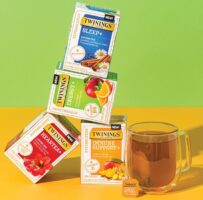
Twinings new Superblends wellness line is designed to help consumers ’feel good, live well and enjoy life.’ Image: Twinings North America
“Our ‘Drink in Life’ campaign is rooted in the idea that taking even the smallest step counts when it comes to reaching your wellness goals and contributing to your overall health,” said Mike Currie, vice president of marketing at Twinings North America, based in Clifton, New Jersey.
Currie noted that the wellness segment in tea has been growing for a while, but the pandemic has accelerated the interest in wellbeing and beverages that support this. “Consumers are putting their wellbeing at the forefront and paying close attention to the products that they’re consuming,” he said. “From an overall industry perspective, this directly correlates to the steady increase in wellness tea sales. These consumers are investing in authentic brands that value transparency and put wellbeing within reach with small steps, making them feel optimistic about their purchases.”
Herbal teas are also big in the wellness tea marketplace
When it comes to wellness teas, it’s important to note that herbals teas and herbal blends are among the teas on the rise, in addition to true teas from the Camellia sinensis plant.
On the whole, the herbal beverages market, which includes herbal tea, is experiencing considerable growth, according to a new report from analysts at Vantage Market Research. In fact, the herbal beverages market is expected to reach USD $2.45 billion by 2028, growing at a compound annual growth rate (CAGR) of 5.1 per cent between 2021 and 2028. Factors like the rising awareness of the advantages of herbal-based beverages – such as replenishing skin from the inside, enhancing health, supporting healthy joints and rejuvenating the body – are facilitating the growth of the market for herbal beverages, according to the research firm. The herbal tea segment, specifically, is anticipated to grow more than 4.6 per cent CAGR over the forecast period.
Northern California-based tea author, educator and tea festival organiser, Babette Donaldson, owner and publisher of T Ching and the founder of the International Tea Sippers Society, noted, “The sense of helplessness and frustration in this time of Covid-19 motivates many to look to ancient healing lore. Many do this to feel that there are ways to take control of one’s own well-being. In the past, some in the tea industry have focused on the ‘tea and health’ message to include only Camellia sinensis. But customers are looking for something more inclusive in their cups. Resources for herbalism are abundant and bridge many cultural divides.”
The next wave of wellness teas?
In a recent World Tea Conference + Expo white paper, Euromonitor International’s senior beverages consultant, Matthew Barry, based in Chicago, Illinois, pointed out that while not a cure, tea can serve as a valuable temporary oasis in a chaotic world. “An opportune area in the US market in the near future will be teas designed for relaxation and mindfulness,” said the senior beverages consultant. “While many beverage categories are eager to address this growing consumer need, tea starts with a considerable advantage. Tea – herbal tea in particular – is already strongly associated with calming effects. Chamomile, for example, has been used as a calming ingredient in tea since the time of the ancient Egyptians, so herbal tea could be said to have been active in the calming functional space for millennia. Consumers hardly need to know this history to be familiar with the idea that chamomile, mint, valerian or other herbs promote a sense of calm – and there is a new wave of teas targeting this space.”
Barry also noted, “Stress and anxiety levels continue to be at an all-time high. Tea can provide moments of quiet and calm amidst the turbulence. The American tea industry needs to prioritise products and blends that address mental health concerns. If done effectively, the mindfulness space will be the most dynamic in the US tea industry for years to come.”
- Aaron Kiel, based in Raleigh, North Carolina, has worked in the tea, coffee and beverage industries for nearly two decades, and he’s the editor of World Tea News. He’s a journalist and writer at heart, but he also wears a public relations “hat” through his PR consultancy, ak PR Group. He can be reached at [email protected].

